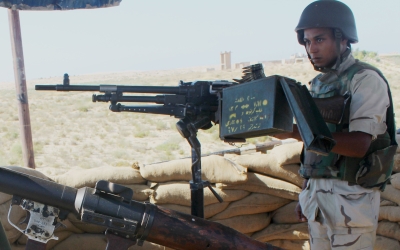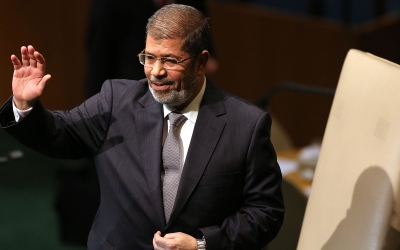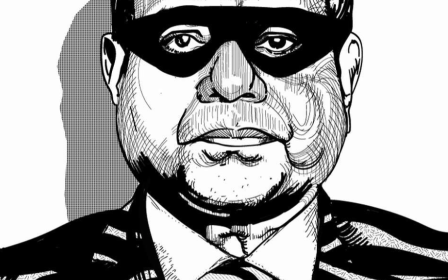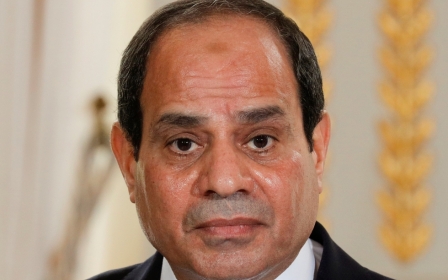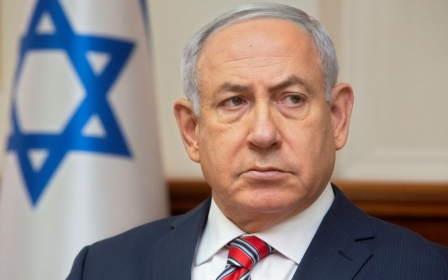'Vital security interest': Why Israel is quietly rooting for Egypt's Sisi
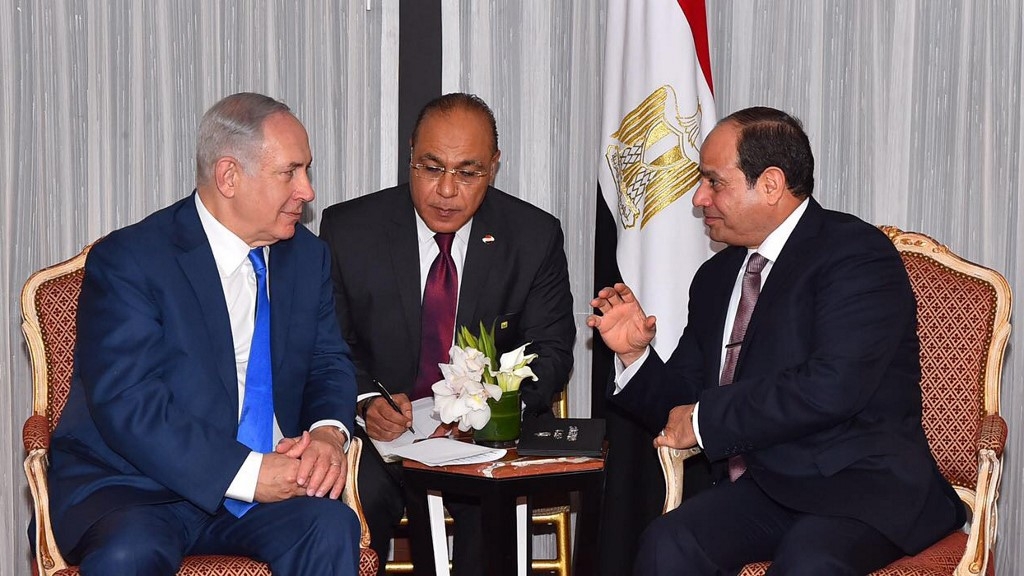
Egyptian President Abdel Fattah el-Sisi is not the only one playing down the outbreak of protests against his rule. So too are politicians and media in neighbouring Israel.
The lack of coverage of last month's demonstrations in Cairo and other cities, and the crackdown that has followed them, can be easily dismissed as a product of the Israeli media's current preoccupation with domestic politics and the saga of the continuing efforts to form a new government.
International coverage, meanwhile, has remained focused on Iran and continuing tensions in the Gulf.
Yet, talking off the record, members of the Israeli parliament uncharacteristically reluctant to speak publicly on the issue say there is deep concern about the future of a man who is often labelled as "the most pro-Israeli Egyptian leader ever".
They also recognise that any Israeli expression of concern to that effect is bound to do more harm than good to a leader already criticised in parts of the Arab world for being exactly that.
New MEE newsletter: Jerusalem Dispatch
Sign up to get the latest insights and analysis on Israel-Palestine, alongside Turkey Unpacked and other MEE newsletters
Open cooperation
In the years since Sisi seized power in 2013, the Egyptian and Israeli governments have moved from working tacitly together to open cooperation, a relationship reinforced by photo ops featuring Sisi with Israeli Prime Minister Benjamin Netanyahu.
'He, unlike Mubarak, is the strongman post-2011 Tahrir Square, and he knows where it can lead'
- Zvi Magen, former Israeli military intelligence officer
"I certainly hope Sisi survives this round of protests," said Zvi Magen, a former high-ranking officer in Israeli military intelligence and now a senior research fellow at the Institute for National Security Studies (INSS).
"Even if some define Sisi as a dictator who came to power by use of force, he is a more positive player than his predecessors," Magen told Middle East Eye.
"He, unlike Mubarak, is the strongman post-2011 Tahrir Square, and he knows where it can lead. He is bound to be much more cautious."
Magen said it did not appear that the situation in Egypt would lead to "full-blown violence" and that Israeli military intelligence and the government would wait to see how it developed.
Intelligence sharing
But he also said Israel could help Sisi discreetly by providing him with intelligence.
"We do not have an opinion as to what the Egyptian regime should look like, but a messy situation is bad for both sides. Israel can help him with intelligence information, but certainly should not interfere."
Amiram Levin, a former deputy head of the Mossad intelligence agency, told MEE that Sisi was also paying a price for his open relations with Israel.
"Iran, for instance, classifies him as an enemy. In general, this serves as a propaganda factor against him," Levin said.
"Here Netanyahu is totally wrong when he runs to spread the good news of friendship."
The relationship between Sisi and Netanyahu is not one of mutual chemistry between leaders, however, but one of shared interests.
Under Sisi, military cooperation with Israel in the Sinai has reached unprecedented levels, with both countries identifying Islamic State- and al-Qaeda-linked militants in the peninsula as a common threat.
While Egyptian forces are waging the war there on the ground, Israel is providing crucial intelligence for the campaign.
Sisi has also played an important role as a broker in the bloody conflict between Hamas and Israel in Gaza.
While criticising Israel's use of excessive force and the subsequent deaths of civilians, he also considers Hamas to be an enemy of Egypt, even while hosting Hamas leaders for talks in Cairo, and convening a donors conference for the reconstruction of Gaza.
This careful manoeuvring has made him an important player in the region, but also a target for countries with other interests, including Turkey and Iran.
Here too, analysts say, an intelligence relationship with Israel has likely proved useful for Sisi.
Despite the close ties however, Israeli-Egyptian relations are always accompanied by some level of suspicion.
'The security of Egypt and its political system – certainly now the security of President Sisi – are a vital security interest for Israel'
- Efraim Halevy, former head of the Mossad
Many then-prominent Israelis suspected that Egyptian president Anwar Sadat's 1977 visit to Israel and the 1979 peace treaty between the countries were a dangerous trap.
Two decades later in 2001, Avigdor Lieberman suggested that Israel should bomb the Aswan Dam if Egypt continued to build up military forces in the Sinai, and for many years the now-former defence minister believed the Egyptians were secretly preparing for another war with Israel.
"Some level of suspicion is understandable," Efraim Halevy, the head of the Mossad from 1998 to 2002, told MEE, emphasising the importance of stability in Egypt for Israel.
"The security of Egypt and its political system – certainly now the security of President Sisi – are a vital security interest for Israel. Egypt has the largest population in the Arab world and a long border with Israel and Sinai."
On the other side of the border, he added, Islamist militants were waging a continuous war against Sisi and the Egyptian leadership.
"This aspect, together with the peace and stability of Jordan, provide irreplaceable security capabilities for Israel," said Halevy.
One practical way for Israel to help Sisi, Halevy suggested, would be to make sure Washington is aware of his leadership's strategic importance to Israel.
The lesson of Morsi
Levin, however, believes that Israel should also heed the lessons of past occasions when it has involved itself in the domestic politics of its neighbours, with unpredictable and dangerous consequences.
The democratic election in 2012 of the Muslim Brotherhood-backed predecessor Mohamed Morsi was considered to be Israel’s worst nightmare. Yet in office, he was more pragmatic than expected prior to his ousting by Sisi in a military coup.
Contrary to Israel's initial concerns and perhaps conscious of his dependency on US aid, Morsi never attempted to end the peace agreement between Israel and Egypt, and security coordination never stopped.
And while he improved ties with Hamas, Morsi's government stayed away from direct involvement in periodic clashes between Hamas and Israel, working instead to broker a ceasefire in Gaza.
"That was a lesson to learn," said Levin. "Israel should not have expressed that level of dissatisfaction and fear [about Morsi]."
Levin also cites the example of Israel's support for Bashir Gemayel, the Christian militia leader who was assassinated after being elected president of Lebanon in 1982.
The killing plunged Lebanon even deeper into a civil war which raged until 1990, with Israeli forces occupying the south of the country until their withdrawal in 2000.
He says that while Israel may have a "fantastic understanding" of what is going on in neighbouring countries, it should recognise the limits of its ability to influence societies with complex traditions and histories of their own stretching back decades and centuries.
"Israel has no particular interest in neighbouring dictatorships nor in strengthening regimes around us," he said. "Any kind of interference turns out to be a horrific mistake."
This article is available in French on Middle East Eye French edition.
Middle East Eye delivers independent and unrivalled coverage and analysis of the Middle East, North Africa and beyond. To learn more about republishing this content and the associated fees, please fill out this form. More about MEE can be found here.


